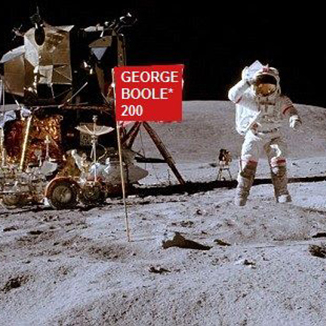
George Boole 200 Takes Off
Our monthly newsletter will include updates on a wide-reaching schedule of events and features interviews with academics in Cork around the world, as we celebrate the bicentennial of George Boole, forefather of the Information Age.
This month, we launched a new monthly newsletter to keep our academic audience and local followers up to date on the George Boole 200 programme of events. Each newsletter will highlight original content on our website and feature a conversation with scholar about the impact of George Boole. This month we had the pleasure of interviewing Colm Mulcahy, who recently wrote about the many Poet Mathematicians from Ireland, for The Huffington Post.
Why Maths?
It's only logical! It's exciting, beautiful and mysterious all at the same time, extremely useful, explains so much, and can be used to predict the future.
Explain Boolean Logic in 1 sentence or less
IF you want to understand how common human thought processes evolved to provide the GATEway to the information age, OR you're interested in the earlier field of electronics, AND you're not frightened by organising concepts using algebraic symbols, THEN George Boole is your only man!
In your article, there are many figures who were both ‘Saints and Scholars’ – Boole himself was a poet! Why so many hidden talents?
Mathematical talent can translate into competence or better, and sometimes even success, in other arenas like music, art and poetry. Those art forms are heavily based on concepts that also pervade maths, such as patterns, symmetry and rhythm. Structure and strategy play a huge role in the theatre too, and Colm Tóibín, writing about the novels of Jane Austin in his book New Ways to Kill Your Mother, says "a novel is a set of strategies, closer to something in mathematics or quantum physics than something in ethics or sociology."
Favourite Irish scientist or inventor?
Mathematician John Casey (1820-1891) is my new hero. He was educated in Mitchelstown, having been born just over the Limerick border in Kilbehenny. In his middle years he got to attend TCD, and in 1867 unsuccessfully applied for the vacant chair of mathematics at Queen's College, Cork. Circa 1873, he declined a job offer from Trinity in favour of becoming professor of maths at the newly founded Catholic University of Ireland (later to become UCD). In the 1880's he wrote 7 books on geometry, including spherical geometry. Look up Casey's Theorem!
Best maths joke:
Did you hear about this year's Fibonacci Number Conference? It was as big as the previous two years conferences combined!
Without delving into history or advanced science, how can we make math more accessible?
To quote the great expositor Martin Gardner: “The best way, it has always seemed to me, to make mathematics interesting to students and laymen is to approach it in a spirit of play. … Surely the best way to wake up a student is to present him with an intriguing mathematical game, puzzle, magic trick, joke, paradox, model, limerick, or any of a score of other things that dull teachers tend to avoid because they seem frivolous.”
Most overlooked, revolutionary theorem?
This one is not significant in the Great Scheme of Things, but it’s entertaining and easy to remember. It seems to have been noticed a century ago. It’s called the Inscribed Circle Theorem:
If you draw any closed curve (one that ends where it started) on a flat piece of paper, then you can always find 4 points on it which form the corners of a square.
There are those magic words IF and THEN once more! Change the curve if you like, to try and outwit the theorem. You’ll find that if you destroy an old square, then a new one will magically appear! That’s the beauty of maths. We know it can’t fail.The most general proof of this fascinating result dates from 1989, and that's quite recent. What is the significance of that square? I don’t know, but perhaps some alert reader will have a useful insight.
That’s the beauty of mathematics, anyone can make an original contribution, regardless of background or training, although admittedly most people who make progress in the field have studied it for years. George Boole, a language enthusiast who was largely self-taught in mathematics, was one of those exceptional outsiders, a man whose gifts and hard work took him from near poverty in Lincolnshire in England to the upper echelons of academia, in Cork as it happens, at a time when higher education wasn’t available to most Irish people. He made astonishing contributions to the totality of human achievements and we reap the benefits of those every day, in ways that would have been inconceivable 150 years ago.
As Des MacHale says in his excellent George Boole biography, “His name will live on as long as computers which depend so vitally on Boolean algebra continue to operate…”
Contributor bio:
A conversation with Colm Mulcahy
Colm Mulcahy got his BSc and MSc at UCD, and then trained as an algebraist at Cornell University, earning his PhD in 1985. He has tong taught at Spelman College in Atlanta, where he is Professor of Mathematics. He has won the Mathematical Association of America's Allendoerfer Award for excellence in expository writing, for a 1996 paper on wavelet image compression, and in 2013 he published the book Mathematical Card Magic: Fifty-Two New Effects. He blogs and tweets a lot about mathematics. His latest project is the online Archive of Irish Mathematics & Mathematicians which also seeks to track all Irish maths books.